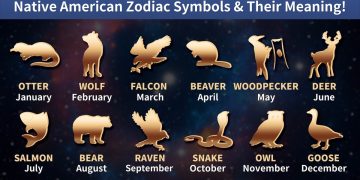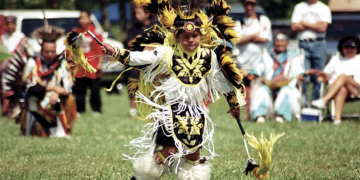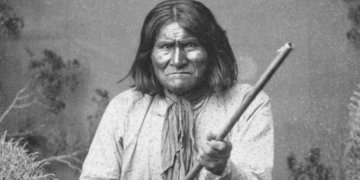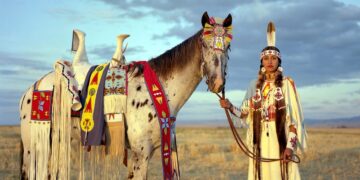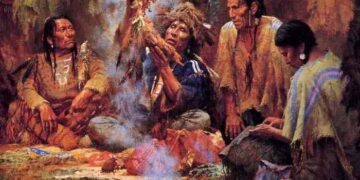Native American leaders have played a pivotal role in shaping U.S. history, from battles for land and sovereignty to cultural innovations and diplomatic achievements. Here are 12 influential figures whose leadership, bravery, and impact have left a lasting mark on the nation.
Powhatan
Powhatan, also known as Wahunsenacawh, was the powerful chief of the Powhatan Confederacy in early 1600s Virginia, which controlled 30 tribes and over 15,000 people. Best remembered as the father of Pocahontas, Powhatan’s interactions with English settlers fluctuated from peaceful cooperation to open warfare, reflecting the complexities of early colonial relationships. His legacy endures through his efforts to navigate the challenges posed by European settlers.
Tamanend
Tamanend, a Lenni-Lenape chief, was celebrated for his wisdom and generosity, particularly in the 1682 Treaty of Shackamaxon with William Penn. Known as the “Affable One,” Tamanend became an enduring symbol of peace and unity. His legacy lived on as a political icon, influencing the formation of the Tammany Hall organization, which shaped New York City politics for over a century.
Joseph Brant
Joseph Brant, or Thayendanegea, was a Mohawk leader who fought for the British during the French and Indian War and the American Revolution. Brant’s leadership united several Iroquois nations in support of the British, and he later worked to secure peace and stability for his people. His scholarly and warrior background made him a prominent figure in Native American and colonial history.
Sequoyah
Sequoyah, a Cherokee silversmith and artist, created the Cherokee syllabary, a written system that transformed his people’s ability to communicate and preserve their language. His work, adopted by the Cherokee Nation in 1825, helped the tribe develop a strong cultural and educational foundation, leaving an enduring legacy of literacy and identity.
Tecumseh
Tecumseh, a Shawnee leader, is remembered for his resistance against American encroachment on Native lands. He formed a pan-Indian alliance to defend Indigenous territory and faced off against General William Henry Harrison at the Battle of Tippecanoe. Although Tecumseh died in battle in 1813, his vision of Native unity and resistance continues to inspire Native leaders today.
Sacagawea
Sacagawea, a Lemhi Shoshone woman, is best known for her role as a guide and interpreter on the Lewis and Clark expedition. Despite being a young mother, Sacagawea’s knowledge of the land, languages, and plants helped ensure the success of the expedition, and her contributions have made her a symbol of resilience and strength.
Red Cloud
Red Cloud was a prominent Oglala Lakota chief who led his people in the successful Red Cloud’s War, culminating in the Fetterman Massacre of 1866. Known for his tactical brilliance, Red Cloud later shifted to a path of diplomacy, negotiating peace and pushing for Native rights, securing his place as one of the most respected Lakota leaders.
Sitting Bull
Sitting Bull, a Hunkpapa Lakota chief, was a key figure in the Great Sioux War and the historic victory at the Battle of the Little Bighorn in 1876. Known for his fierce resistance to U.S. government policies, Sitting Bull’s vision of independence and strength resonated beyond his lifetime, cementing his status as a hero of Native resistance.
Crazy Horse
Crazy Horse, a legendary Oglala Lakota warrior, fought with distinction at the Fetterman Massacre and led the charge at the Battle of the Little Bighorn alongside Sitting Bull. Known for his fierce independence and refusal to be photographed, Crazy Horse’s legacy lives on through the ongoing construction of the Crazy Horse Memorial in South Dakota.
Geronimo
Geronimo, a Chiricahua Apache leader, fought against Mexican and American forces seeking control over his people’s lands in modern-day Arizona and New Mexico. His legendary resistance, combined with mystical stories of his powers, made Geronimo one of the last Native American leaders to surrender to U.S. forces in 1886.
Chief Joseph
Chief Joseph, leader of the Nez Perce, is remembered for his dignified surrender after leading his people in a desperate retreat to avoid forced relocation. Known as the “Red Napoleon,” his leadership and the iconic phrase, “I will fight no more forever,” symbolize the heartbreak and resilience of his people.
Wilma Mankiller
Wilma Mankiller, the first female chief of the Cherokee Nation, served from 1985 to 1995 and became a pioneering figure in Native American leadership. Under her leadership, the Cherokee Nation saw tremendous growth in health, education, and economic development. Mankiller’s activism earned her the Presidential Medal of Freedom in 1998, cementing her legacy as a champion for Native rights and social justice.
These leaders, from Powhatan to Wilma Mankiller, represent the diverse strengths and contributions of Native Americans throughout history. Their leadership, courage, and vision have shaped not only their own peoples but also the broader course of American history. Their stories remind us of the resilience and strength of Native nations in the face of adversity.

